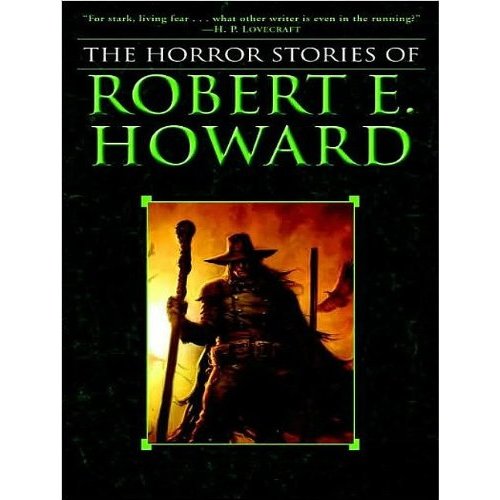
Cover from the collection The Horror Stories of Robert E. Howard (2008).
Background Colour: -White- -NavajoWhite- -Wheat- -Beige- -AntiqueWhite- -LightGray- -Silver- -BurlyWood- -Tan- -Black- -Blue-
Text Colour: -Black- -Brown- -Blue- -Green- -Red- -Yellow- -White- -Orange- -Silver-
Published in The Howard Collector, Spring 1967,
though here taken from the 2008 collection The Horror Stories of Robert E. Howard.
Beneath the glare of the sun, etched in the hot blue sky, native laborers sweated and toiled. The scene was a cameo of desolation—blue sky, amber sand stretching to the skyline in all directions, barely relieved by a fringe of palm trees that marked an oasis in the near distance. The men were like brown ants in that empty sun-washed immensity, pecking away at a queer grey dome half hidden in the sands. Their employers aided with directions and ready hands.
Allison was square-built and black bearded; Brill was tall, wiry, with a ginger-hued moustache and cold blue eyes. Both had the hard bronzed look of men who had spent most of their lives in the outlands.
Allison knocked out the ashes from his pipe on his boot heel.
“Well, how about it?”
“You mean that fool bet?” Brill looked at him in surprise. “Do you mean it?”
“I do. I’ll lay you my best six-shooter against your saddle that we don’t find an Egyptian in this tomb.”
“What do you expect to find?” asked Brill quizzically, “a local shaykh? Or maybe a Hyksos king? I’ll admit it’s different from anything of the sort I’ve ever seen before, but we know from its appearance of age that it antedates Turkish or Semitic control of Egypt—it’s bound to go back further than the Hyksos, even. And before them, who was in Egypt?”
“I reckon we’ll know after we’ve looted this tomb,” answered Allison, with a certain grimness in his manner.
Brill laughed. “You mean to tell me you think there was a race here before the Egyptians, civilized enough to build such a tomb as this? I suppose you think they built the pyramids!”
“They did,” was the imperturbable reply.
Brill laughed. “Now you’re trying to pull my leg.”
Allison looked at him curiously. “Did you ever read the ‘Unausprechlichen Kulten’?”
“What the devil’s that?”
“A book called ‘Nameless Cults,’ by a crazy German named Von Junzt—at least they said he was crazy. Among other things he wrote of an age which he swore he had discovered—a sort of historical blind spot. He called it the Hyborian Age. We have guessed what came before, and we know what came after, but that age itself has been a blank space—no legends, no chronicles, just a few scattered names that came to be applied in other senses.
“It’s our lack of knowledge about this age that upsets our calculations and makes us put down Atlantis as a myth. This is what Von Junzt says: That when Atlantis, Lemuria and other nations of that age were destroyed by a violent cataclysm—except for scattered remnants here and there—the continent now known as Africa was untouched, though connected with the other continent. A tribe of savages fled to the arctic circle to escape the volcanoes, and eventually evolved into a race known as Hyborians. These reached a high stage of civilization and dominated the western part of the world, all except this particular part. A pre-Cataclysmic race lived here, known as Stygians. It was from them that the Grecian legend of Stygia arose; the Nile was the Styx of the fables. The Hyborians were never able to invade Stygia, and last they themselves were destroyed by waves of barbarians from the north—our own ancestors. In Stygia the ruling classes were pure-blooded, but the lower classes were mixed—Stygian, Semitic and Hyborian blood.
“In the southward drift of the barbarians, a tribe of red-haired Nordics fought their way south and overthrew the ancient Stygian regime. They destroyed or drove out the pure-blooded Stygians, and set themselves up as a ruling caste, eventually being absorbed by their subjects; from these adventurers and the mixed up mongrel lower classes came the Egyptians. It was the Stygians who built the pyramids and the Sphinx. And if I’m not mistaken, one of them lies in this pile of masonry.”
Brill laughed incredulously.